Original Black Panther Party member from Winston Salem visits App State
February 14, 2020
With his fist high up in the air and passionate chants of “Power to the people!” from the crowd, Bradford Lilley took the stage.
Lilley was one of the original members of the Winston-Salem Black Panther Party, whose original intent was to patrol African American neighborhoods and protect residents from police brutality.
“I was there for Malcolm (X), for Martin (Luther King, Jr.)… I was there for all of those that you’ve heard about,” Lilley said.
Lilley said he remembers living in Hertford when the NAACP came into his hometown. He said they spoke about nonviolent methods to integrate schools.
“In the latter part of the sixties, black people were fighting for integration, to be recognized as full citizens in this country, and my mother was a part of that struggle even in the deep South,” Lilley said.
Lilley said on one occasion, the NAACP was planning a demonstration, and the black community came together in one country church.
The NAACP told community members that children had to stay in the church. Lilley said everyone knew that if something happened to their kids, “all hell would break loose.”
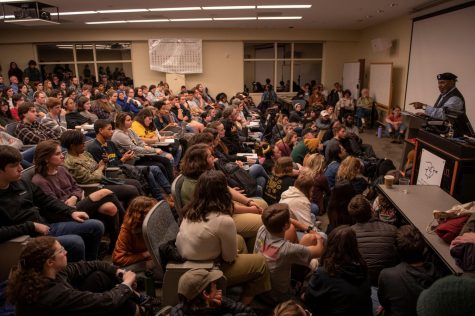
Rev. Dr. Bradford Lilley of High Point, NC, speaks to an overflowing room of App State Students on Tuesday night. Lilley, a former member of the Winston-Salem chapter of the Black Panther Party, spoke about his experiences with racism, police brutality and activism in North Carolina.
”They loaded up and went downtown. The clan knew they were coming…everybody knew. That night, the clan didn’t go to the demonstration. They came to the church, and they shot up the church,” Lilley said.
Bullets flying into the air, Lilley found himself lying on the floor of the church, hiding behind a pew, hoping that he wouldn’t get shot.
“That was my introduction to the civil rights movement,” Lilley said.
The summer of 1968, 16-year-old Lilley found himself in New Jersey with his brother and friends.
When his brother found out the Black Panthers were in Atlantic City they took a bus there.
“My life changed when I met some real bad brothers and sisters. They talked about the struggle and how they needed to be involved and take up arms and fight for their rights,” Lilley said.
Lilley said they were given books and posters. Throughout the summer they paid the Black Panther Party more visits and when it was over, Lilley was back to his segregated suburban town in Hertford.
One day, Lilley and his father were sitting in the living room watching TV, and a man came up on the screen and said, “We’re going to shoot our way into the White House. We’re going to cut off the head of the president, and we’re going to shoot our way back out.”
Lilley said he reacted to the speaker with, “Right on!”
The man on the screen was Eldridge Cleaver, the Black Panther Party’s minister of information.
Lilley said his father’s first words were “I know that man, I’ve seen him somewhere.” That same man was plastered along Lilley’s bedroom walls.
”He went into the bedroom, he tore every poster off the wall..but he didn’t stop there. He took every book I had about black power, black awareness, black anything. He took all my literature. Took it all the backyard, put it in a barrel and set it on fire,” Lilley said.
In 1969, Lilley was headed to Fayetteville State University. He was excited to leave home and not live under his father’s roof.
As he walked onto campus he found himself still having a thirst for knowledge. He wanted to learn about the struggle, and be involved with brothers and sisters that knew “all about this black power thing.” Unfortunately, he faced the reality that the campus he was on wasn’t going to provide that for him.
Lilley said as they were driving into the outskirts of town, there was a billboard high up in the air that showed an image of a Klansmen riding a white horse and the caption read “welcome to klan country.”
Lilley said, eventually, two Black Panther Party members from Winston-Salem visited campus and “that weekend, that’s how I spent my time,”
As they were leaving, “wait a minute” tumbled out of his mouth. Lilley packed his bags, got in the car, and followed the two brothers home.
Lilley said he thought they’d put a gun in his hand and send him out into the streets to raise hell and become a revolutionary.
”They put books in my hands. They said you’ve got to learn about this political system. You’ve got to learn about this racist government. You’ve got to learn about how to have revolution and how to overthrow your oppressor,” Lilley said.
Lilley said nights were spent studying and in the morning they’d get up, feed the children before going off to school, and hit the streets selling newspapers to help the party put other programs in place.
He said the Black Panther Party started a free breakfast program in High Point because they understood that if a child went to school hungry, learning was almost impossible.
Lilley said once the party started feeding children, the entire community showed their support.
”Strange thing about it is J. Edgar Hoover, first Director of the Federal Bureau of Investigation, said that the Black Panther Party’s free breakfast program was the biggest threat to the internal security of the United States,” Lilley said.
Lilley said things such as free ambulance services and free sickle cell clinics were made possible by organizing, not guns.
”We were showing that we could take care of ourselves. We didn’t have to be dependent on anybody. We could fix our own problems, we could be self-sufficient,” Lilley said.
On Feb. 10, 1971, at 5 a.m., over 100 police officers, sheriff’s department, law enforcement and FBI personnel had surrounded the Black Panther’s headquarters in High Point.
”They said they came to evict us. They came to kill us,” Lilley said. “Who gets evicted at 5:30 in the morning…before the sun comes up? They came to kill us. An eviction was just a pretense.”
Lilley said they’d seen raids happen in Black Panther offices one too many times.
After the raid on Feb. 10, Lilley and three fellow Black Panther Party members were taken to trial. Lilley was sentenced and sent to Central Prison in Raleigh. He got out on parole years later, only to find that the Black Panther Party had split.
The Eldridge Cleaver faction wanted action. They wanted to take their guns and initiate a “revolution.” The Huey Newton Faction, however, argued that people weren’t ready and that would only cause more deaths.
Lilley said with this new change he found himself lost, dabbling in drugs, without a job — and in a desperate attempt to get back on his feet, he reached out to his father.
”He refused because I was a Black Panther. I took my gun, went out to the streets and did what I had to do,” Lilley said.
Lilley said he found himself going against Black Panther teachings.
“I became a dope dealer. Whatever you wanted, I had,” Lilley said.
After hitting rock bottom, he had an encounter with Jesus and realized the Christian values he now lived by were the foundation of the Black Panther Party.
”We were feeding the hungry, we were clothing those who needed clothes, we were putting shoes on people’s feet, we were taking care of the widows and the orphans.” Lilley said.
Lilley said that’s exactly what he’d been taught over the years.
”The Black Panther Party taught me that. I tell people today, ‘Yes, I’m a pastor, but I’m (also) a community activist, and this is my first calling, this is my true calling,’” Lilley said.



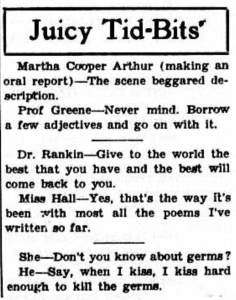

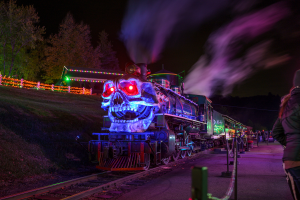

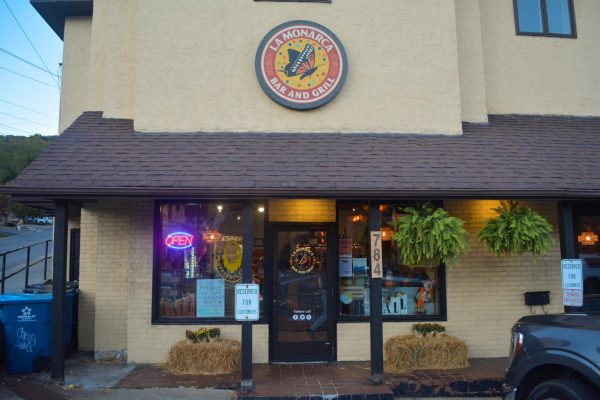
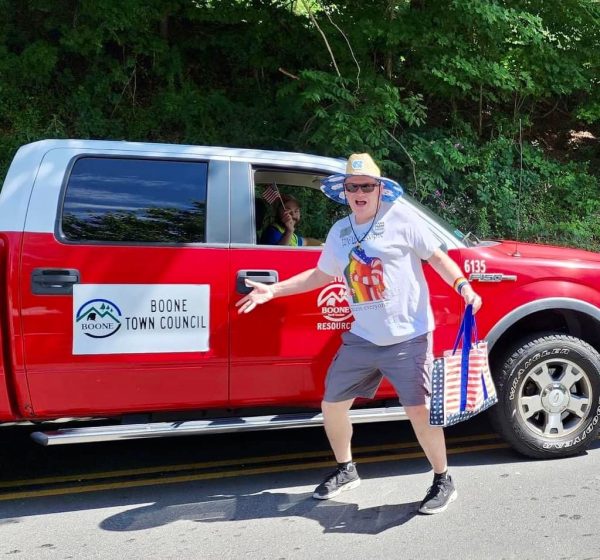
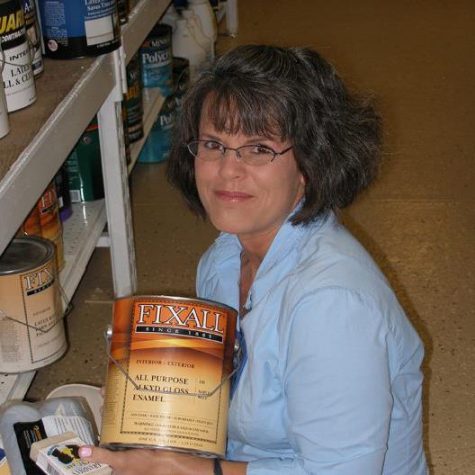


Teddy Gause • Nov 18, 2020 at 7:08 pm
I’m interested in joining the Winston-Salem Black Panthers Party!!